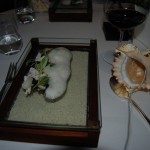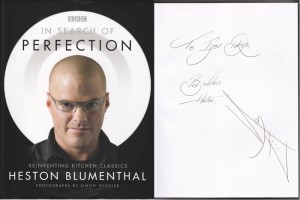The Fat Duck Restaurant
On November 25, 2008 I chanced to be in the world wide famous British restaurant called “Fat Duck”. The restaurant is located in the town of Bray, which is seven minutes’ drive away from Windsor. The owner of the restaurant and its chef is unexcelled culinary alchemist Heston Blumenthal. Near the restaurant there’s the laboratory of taste of Heston Blumenthal. From this laboratory the chef broadcasts to the whole world recipes of his cuisine and tells about the alchemy of these of those culinary products.
In the restaurant I ordered the tasting menu consisting of 20 courses. This whole pleasure cost me 140 English pounds including wine and excellent Chinese oolong. The sight of the feast was unforgettable, and the whole scene was more like a show. I had not experienced such emotions and pleasure for a very long time. Players of football club Chelsea were sitting beside me as well as representatives of English show business and simple gourmets, probably, spies from Michelin.
The restaurant’s capacity is 37 people. It looks like a house of Victorian Epoch. There’s nothing unnecessary, and everything is functional and rational to the uttermost. One has to reserve a seat beforehand. I reserved my seat 2 months ahead of time.
At the end of the meal to thank Mr. Blumenthal for the culinary fairy-tale I gave him a handmade matreshka, which I bought before in one of the little shops on Arbat Street. In response the chef gave me his new book with his autograph as a gift.
I want to tell my readers a little bit about Mr. Blumenthal, his “Fat Duck” and culinary alchemy. In the section “Culinary” I will post several recipes from the chef Heston Blumenthal.
The parents of an Englishman Heston Blumenthal in their worst dream could not imagine that their son would earn money on snail porridge. He was never supposed to become a cook – but he did. He became one of the most learned chefs in the world.
If it hadn’t been for one trip to France Heston would have been an ordinary bank clerk. But when he turned 16, his parents brought him to Provence and once ordered a table in a two-star Michelin restaurant. A lobster sauce flowing upon souffle, a lamb’s leg with fragrant herbs… An elderly sommelier with pomaded mustache… Heston was astounded. He made up his mind that from that day on that would be his life too.
Now, if Blumenthal is told that English cuisine is the most terrible one in the world (after Finnish cuisine as ex-president of France Chirac once said) he is not offended because he understands where this concept came from. When he was a child, in 1970s, it really was terrible. In Britain at that time it was almost impossible to buy good olive oil – to buy a small bottle of Italian exrta virgine one had to go to a drug store! British people brought bread only once for the whole week.
It was common to bake meat only for dinner on Sunday while on other days – to wearily boil it. In grocery stores there were no other kinds of macaronis except spaghettis… In ten years or so the situation changed to such an extent that it is hard to believe that now. And on this new British stage Blumenthal’s “Fat Duck” was able to appear and was awarded in 2005 as the best restaurant of the world and received three stars from Michelin Guide.
For the last five years Heston has been bothered by one main question: in which way the brain interprets the signals sent to it by different organs of sense? Why is the same food loved by somebody and hated by somebody else? Why is the unchangeable taste of a product perceived by the same person differently now and again? His favorite illustration of how strongly the atmosphere can influence taste is this. You come to France, visit castles of Loire and there, under the sunshine, on the riverbank, eat oysters in a small restaurant for dinner and drink white wine muskade. And this is the best muskade you have ever tasted! You buy an entire box of bottles, go back home, invite friends to your small flat, pour the wine, and… it is disgusting! But the problem is not in the wine; in the valley of Loire it was the same. It’s just that you didn’t bring back with you the freshest oysters, the sun and the dash of the waves …
In his restaurant Heston tries to create a special atmosphere. If his customers order the “Sounds of the sea” course that consists of sea products along with it an iPod with cries of seagulls and dash of waves sounding in the earphones will be brought as well. The course itself looks like a box with a glass top, and one can see sand with sea shells inside. In fact, it is not sand at all but a mixture of tapioca and fried crumbs of bread ground together with fried baby eels, seasoned with the oil of cod’s and langoustine’s liver; it includes ear shells, mussels, shrimps, oysters and three kinds of sea weed.
For desert you will get coffee and a silver rose bush with edible petals with the flavor of apples, lychees, coriander and raspberries; and as digestive you will get a bubble gum with the flavor of 18-year old whisky. Compared with this menu Blumenthal’s famous snail porridge looks boring and old-fashioned.
Blumenthal is an inborn researcher. For instance, he wouldn’t mind having a time machine – so great is his interest for old British cuisine. Two of his friends – historians studying cuisine of Hampton Court (former residence of English monarchs) (by the way, I was there also, only in summer, and one day I will tell you about it and “cuisine of Tudors”) – showed Blumenthal letters and recipe books, based on which he drew an unambiguous conclusion: in XVIII century Britain was one of the leading powers not only on the sea but also in cuisine.
At that times cooks tried to cook everything that got into their hands. Some recipes were extreme – for instance, a dish made of pheasant: a bird was skinned, the carcass was fried, and then the skin together with feathers was put back on, and the bird even was set into motion on the table by some mechanic device. A recipe that Blumenthal likes a lot less tells us how to fry a goose alive… No, he does not have the least desire to repeat this process, but he would like to see how cooks carried out their creative ideas at that time.
How Heston Blumenthal himself comes up with his creative ideas – one can only guess. He says anything at all can inspire him: from a new product to bad weather. For example, the hot chocolate and red wine drink was invented by him when he was caught in the rain and got frozen like hell.
If you order a table in Fat Duck via Internet you will immediately be transferred to a web page that is a deserts shop – a small but very rich interactive world. You walk between the shelves and choose “candies” – while they tell you about the menu and philosophy of the restaurant. After dinner as you leave you receive a small package with the sweets on which you clicked in the process of your visiting the web page, – absolutely real. Excellent candies with the flavor of apple pie.
(This information is based on materials received from different sources of the Internet).


